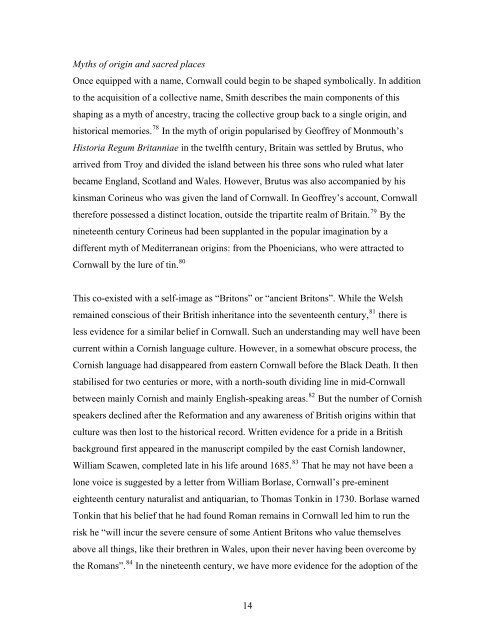Britishness, what it is and what it could be, is now high on both ...
Britishness, what it is and what it could be, is now high on both ...
Britishness, what it is and what it could be, is now high on both ...
Create successful ePaper yourself
Turn your PDF publications into a flip-book with our unique Google optimized e-Paper software.
Myths of origin <str<strong>on</strong>g>and</str<strong>on</strong>g> sacred places<br />
Once equipped w<str<strong>on</strong>g>it</str<strong>on</strong>g>h a name, Cornwall <str<strong>on</strong>g>could</str<strong>on</strong>g> <str<strong>on</strong>g>be</str<strong>on</strong>g>gin to <str<strong>on</strong>g>be</str<strong>on</strong>g> shaped symbolically. In add<str<strong>on</strong>g>it</str<strong>on</strong>g>i<strong>on</strong><br />
to the acqu<str<strong>on</strong>g>is</str<strong>on</strong>g><str<strong>on</strong>g>it</str<strong>on</strong>g>i<strong>on</strong> of a collective name, Sm<str<strong>on</strong>g>it</str<strong>on</strong>g>h descri<str<strong>on</strong>g>be</str<strong>on</strong>g>s the main comp<strong>on</strong>ents of th<str<strong>on</strong>g>is</str<strong>on</strong>g><br />
shaping as a myth of ancestry, tracing the collective group back to a single origin, <str<strong>on</strong>g>and</str<strong>on</strong>g><br />
h<str<strong>on</strong>g>is</str<strong>on</strong>g>torical memories. 78 In the myth of origin popular<str<strong>on</strong>g>is</str<strong>on</strong>g>ed by Geoffrey of M<strong>on</strong>mouth’s<br />
H<str<strong>on</strong>g>is</str<strong>on</strong>g>toria Regum Br<str<strong>on</strong>g>it</str<strong>on</strong>g>anniae in the twelfth century, Br<str<strong>on</strong>g>it</str<strong>on</strong>g>ain was settled by Brutus, who<br />
arrived from Troy <str<strong>on</strong>g>and</str<strong>on</strong>g> divided the <str<strong>on</strong>g>is</str<strong>on</strong>g>l<str<strong>on</strong>g>and</str<strong>on</strong>g> <str<strong>on</strong>g>be</str<strong>on</strong>g>tween h<str<strong>on</strong>g>is</str<strong>on</strong>g> three s<strong>on</strong>s who ruled <str<strong>on</strong>g>what</str<strong>on</strong>g> later<br />
<str<strong>on</strong>g>be</str<strong>on</strong>g>came Engl<str<strong>on</strong>g>and</str<strong>on</strong>g>, Scotl<str<strong>on</strong>g>and</str<strong>on</strong>g> <str<strong>on</strong>g>and</str<strong>on</strong>g> Wales. However, Brutus was also accompanied by h<str<strong>on</strong>g>is</str<strong>on</strong>g><br />
kinsman Corineus who was given the l<str<strong>on</strong>g>and</str<strong>on</strong>g> of Cornwall. In Geoffrey’s account, Cornwall<br />
therefore possessed a d<str<strong>on</strong>g>is</str<strong>on</strong>g>tinct locati<strong>on</strong>, outside the tripart<str<strong>on</strong>g>it</str<strong>on</strong>g>e realm of Br<str<strong>on</strong>g>it</str<strong>on</strong>g>ain. 79 By the<br />
nineteenth century Corineus had <str<strong>on</strong>g>be</str<strong>on</strong>g>en supplanted in the popular imaginati<strong>on</strong> by a<br />
different myth of Med<str<strong>on</strong>g>it</str<strong>on</strong>g>erranean origins: from the Phoenicians, who were attracted to<br />
Cornwall by the lure of tin. 80<br />
Th<str<strong>on</strong>g>is</str<strong>on</strong>g> co-ex<str<strong>on</strong>g>is</str<strong>on</strong>g>ted w<str<strong>on</strong>g>it</str<strong>on</strong>g>h a self-image as “Br<str<strong>on</strong>g>it</str<strong>on</strong>g><strong>on</strong>s” or “ancient Br<str<strong>on</strong>g>it</str<strong>on</strong>g><strong>on</strong>s”. While the Welsh<br />
remained c<strong>on</strong>scious of their Br<str<strong>on</strong>g>it</str<strong>on</strong>g><str<strong>on</strong>g>is</str<strong>on</strong>g>h inher<str<strong>on</strong>g>it</str<strong>on</strong>g>ance into the seventeenth century, 81 there <str<strong>on</strong>g>is</str<strong>on</strong>g><br />
less evidence for a similar <str<strong>on</strong>g>be</str<strong>on</strong>g>lief in Cornwall. Such an underst<str<strong>on</strong>g>and</str<strong>on</strong>g>ing may well have <str<strong>on</strong>g>be</str<strong>on</strong>g>en<br />
current w<str<strong>on</strong>g>it</str<strong>on</strong>g>hin a Corn<str<strong>on</strong>g>is</str<strong>on</strong>g>h language culture. However, in a some<str<strong>on</strong>g>what</str<strong>on</strong>g> obscure process, the<br />
Corn<str<strong>on</strong>g>is</str<strong>on</strong>g>h language had d<str<strong>on</strong>g>is</str<strong>on</strong>g>appeared from eastern Cornwall <str<strong>on</strong>g>be</str<strong>on</strong>g>fore the Black Death. It then<br />
stabil<str<strong>on</strong>g>is</str<strong>on</strong>g>ed for two centuries or more, w<str<strong>on</strong>g>it</str<strong>on</strong>g>h a north-south dividing line in mid-Cornwall<br />
<str<strong>on</strong>g>be</str<strong>on</strong>g>tween mainly Corn<str<strong>on</strong>g>is</str<strong>on</strong>g>h <str<strong>on</strong>g>and</str<strong>on</strong>g> mainly Engl<str<strong>on</strong>g>is</str<strong>on</strong>g>h-speaking areas. 82 But the num<str<strong>on</strong>g>be</str<strong>on</strong>g>r of Corn<str<strong>on</strong>g>is</str<strong>on</strong>g>h<br />
speakers declined after the Reformati<strong>on</strong> <str<strong>on</strong>g>and</str<strong>on</strong>g> any awareness of Br<str<strong>on</strong>g>it</str<strong>on</strong>g><str<strong>on</strong>g>is</str<strong>on</strong>g>h origins w<str<strong>on</strong>g>it</str<strong>on</strong>g>hin that<br />
culture was then lost to the h<str<strong>on</strong>g>is</str<strong>on</strong>g>torical record. Wr<str<strong>on</strong>g>it</str<strong>on</strong>g>ten evidence for a pride in a Br<str<strong>on</strong>g>it</str<strong>on</strong>g><str<strong>on</strong>g>is</str<strong>on</strong>g>h<br />
background first appeared in the manuscript compiled by the east Corn<str<strong>on</strong>g>is</str<strong>on</strong>g>h l<str<strong>on</strong>g>and</str<strong>on</strong>g>owner,<br />
William Scawen, completed late in h<str<strong>on</strong>g>is</str<strong>on</strong>g> life around 1685. 83 That he may not have <str<strong>on</strong>g>be</str<strong>on</strong>g>en a<br />
l<strong>on</strong>e voice <str<strong>on</strong>g>is</str<strong>on</strong>g> suggested by a letter from William Borlase, Cornwall’s pre-eminent<br />
eighteenth century natural<str<strong>on</strong>g>is</str<strong>on</strong>g>t <str<strong>on</strong>g>and</str<strong>on</strong>g> antiquarian, to Thomas T<strong>on</strong>kin in 1730. Borlase warned<br />
T<strong>on</strong>kin that h<str<strong>on</strong>g>is</str<strong>on</strong>g> <str<strong>on</strong>g>be</str<strong>on</strong>g>lief that he had found Roman remains in Cornwall led him to run the<br />
r<str<strong>on</strong>g>is</str<strong>on</strong>g>k he “will incur the severe censure of some Antient Br<str<strong>on</strong>g>it</str<strong>on</strong>g><strong>on</strong>s who value themselves<br />
above all things, like their brethren in Wales, up<strong>on</strong> their never having <str<strong>on</strong>g>be</str<strong>on</strong>g>en overcome by<br />
the Romans”. 84 In the nineteenth century, we have more evidence for the adopti<strong>on</strong> of the<br />
14
















